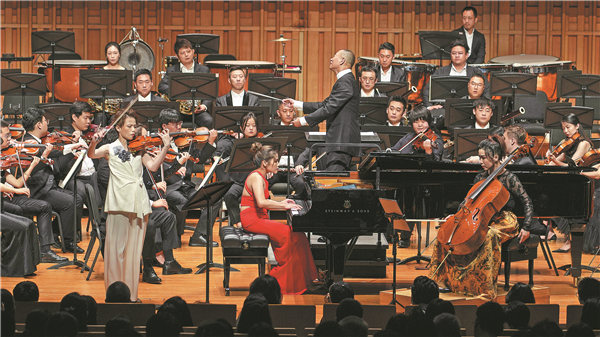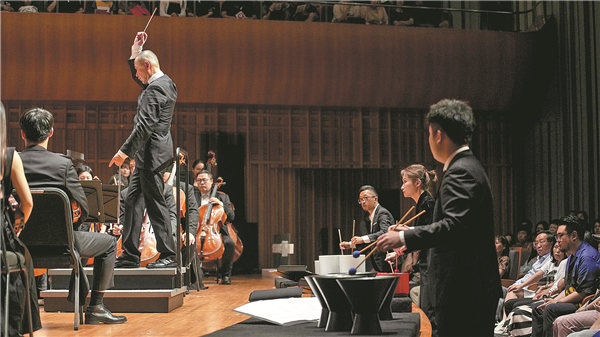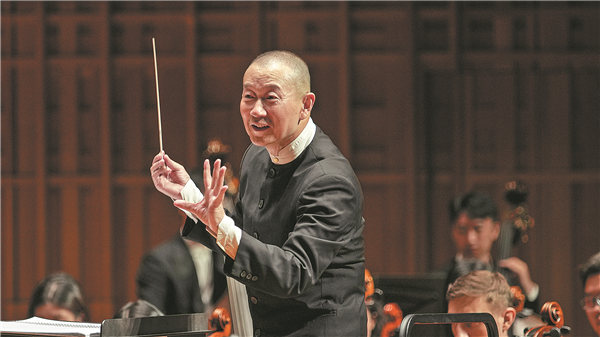Musical salute to the first emperor

Tan Dun takes the baton to lead the Xi'an Symphony Orchestra in performing his Symphony of the First Emperor in Xi'an, Shaanxi province, this month. It is the first time that the work has been performed in China. [Photo provided to China Daily]
Composer brings symphony 'home' to Xi'an for Chinese premiere, Chen Nan reports.
Tan Dun has traveled to Xi'an, Shaanxi province, many times. The ancient city has long fascinated the composer for various reasons — the delicious food, the world-renowned Terracotta Warriors, and Qinqiang Opera, a type of traditional Chinese opera popular in Shaanxi.
This month, Tan returned to the city once more, this time with a special purpose.
Along with the Xi'an Symphony Orchestra, on July 15, he conducted his Symphony of the First Emperor, the first time that the work has ever been performed in China.
"Many Chinese symphony orchestras wanted to premiere the work in China but Xi'an is the perfect city for it," Tan, 65, told China Daily two days before the concert. "I came to Xi'an many years ago when I was preparing to compose the piece, and I was inspired by the city. It's like it has returned to its hometown."
The composer and conductor is, arguably, best known for the Oscar-winning score he composed for director Ang Lee's martial arts film Crouching Tiger, Hidden Dragon.
Symphony of the First Emperor was based on the music from Tan's opera The First Emperor. In 2006, The First Emperor was premiered at the Metropolitan Opera House, which had commissioned the production in cooperation with the Los Angeles Opera. Directed by Chinese filmmaker Zhang Yimou and conducted by Tan, the opera is about Qinshihuang, the first ruler of the Qin Dynasty (221-206 BC), who united the country, began construction of the Great Wall, and issued orders for almost universal standardization of, among other things, weights, measures, the written language and the law.
The celebrated opera star Placido Domingo played the lead role of Qinshihuang.

Tan Dun takes the baton to lead the Xi'an Symphony Orchestra in performing his Symphony of the First Emperor in Xi'an, Shaanxi province, this month. It is the first time that the work has been performed in China. [Photo provided to China Daily]
In the opera, Qinshihuang commissions a musician, Gao Jianli, to compose an anthem for his empire. When he discovers that his daughter has fallen in love with Gao, Qinshihuang, despite appreciating Gao's musical talent, becomes angry because he wants his daughter to marry a general for political reasons.
In 2017, when The Metropolitan Museum of Art put on a large exhibition, Age of Empires: Chinese Art of the Qin and Han Dynasties (221 BC-AD 220), the museum commissioned a new work from Tan based on the music from the opera, which became Symphony of the First Emperor.
"Basically, the version we perform in Xi'an is the same as the one for the exhibition of The Metropolitan Museum of Art. But since most of the musicians of the Xi'an Symphony Orchestra are from Xi'an, which gives them a special connection with the composition, the performance will be unique," says Tan, adding that the performance in Xi'an involves some special musical instruments created exclusively for the city — ceramic percussion instruments.
Symphony of the First Emperor features seven chapters, each named after different colors and wu xing (the five elements in ancient Chinese philosophy). For example, the first chapter is called Black and White (Yin-Yang Master), the second chapter is called Red (Emperor's Dance) and the fifth chapter is called Purple (Revenge).
Tan attributes the naming of the chapters to director Zhang, who was born in Xi'an.
"When we worked on the opera, Zhang told me about lao san se, or the three colors of Shaanxi, which are black, white and red. These colors are often used by people in Shaanxi and also appear in his films. He also inspired Emi Wada, who designed the costumes for the opera, to use the traditional tie-dyeing technique of Shaanxi in the making of the costumes," recalls Tan.
Lao san se was also used during the premiere of Symphony of the First Emperor in Xi'an. Ceramic percussion instruments were painted black, white and red, with percussionists playing the instruments in front of the orchestra.
"Those percussion instruments were from books about music of the Qin Dynasty that Tan had read," says Lu Shan, principal percussionist of Xi'an Symphony Orchestra. He notes that the way of playing the instruments is quite different from playing contemporary percussion instruments.
"We kneel down on the stage and play the instruments, which is a new experience," Lu explains.

Tan Dun, composer and conductor [Photo provided to China Daily]
During the Chinese premiere of Symphony of the First Emperor, Tan invited an old friend to attend, scriptwriter Lu Wei, who is also a native of Xi'an.
Back in the 1990s, when Tan studied on a scholarship at Columbia University, New York, where he received his Doctor of Musical Arts degree in 1993, he was introduced to a Chinese movie by his wife. The movie, The Emperor's Shadow, which is about the friendship between Qinshihuang and Gao, as well as the love between Gao and Qinshihuang's daughter, Princess Yueyang, was directed by Zhou Xiaowen and the script was written by Lu Wei.
Chinese actor Jiang Wen played the role of Qinshihuang, actor Ge You played the role of Gao and actress Xu Qing portrayed the princess.
"I was intrigued by the ambitious story of Qinshihuang and his relationship with the musician, who has great talent and a pure passion for his art. When the Metropolitan Opera House commissioned me to write the opera, I soon proposed an idea based on that story," recalls Tan.
When Tan met the scriptwriter, he was surprised to find out that Lu Wei had not only carried out lots of research about Qinshihuang and the story between the emperor and Gao, but is also a music lover who travels around Shaanxi to collect folk music.
"Tan loves Qinqiang Opera, so do I. I love humming Qinqiang Opera pieces when I write scripts," says Lu Wei. "When I watched his opera, The First Emperor, some parts were very similar to the movie, but others were beyond my imagination."
One of the most memorable parts in the opera, as Lu Wei recalls, was having Peking Opera actor Wu Hsing-kuo playing the role of the Yin-Yang Master, a narrator, who outlines the story through a striking mixture of singing, dancing and acrobatics against a backdrop of Chinese drummers and a chorus. Wu's performances featured elements of Qinqiang Opera.
"For Symphony of the First Emperor, Tan creates an amazing balance between Western music and Chinese music. Though the music is abstract, he uses it to tell a very romantic story," Lu Wei says.


